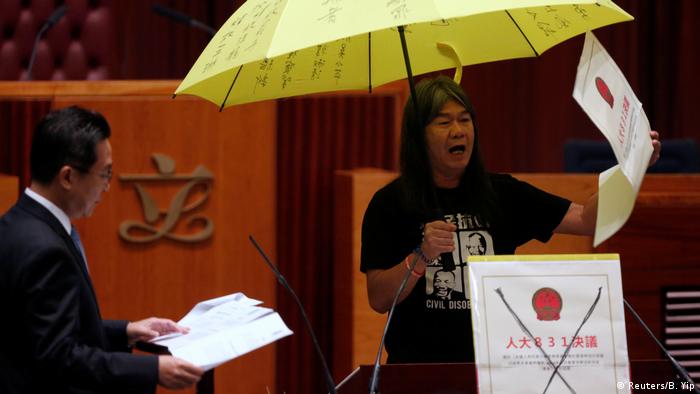By Zheping Huang

Yau Wai-ching takes to the podium.

Hong Kong’s pro-democracy lawmakers have long used the swearing-in ceremony, held every four years, to defy Beijing’s creeping control over the semi-autonomous city.
In the past, for instance, they’ve added new phrases to the oath, or chanted anti-Beijing slogans before or after approaching the podium, or carried banners with words (like “universal suffrage”) sure to irritate the mainland’s Chinese Communist Party.
It’s become something of a tradition.
The latest swearing-in ceremony was held on Oct. 12, and some fine additions to the tradition were added to the mix.
The latest swearing-in ceremony was held on Oct. 12, and some fine additions to the tradition were added to the mix.
One lawmaker toted a yellow umbrella—a symbol of the 2014 Occupy protests—and another held a torn-up copy of controversial legislation helping Beijing pre-screen candidates for Hong Kong’s top position of “chief executive.”
But then things took a funny turn, thanks to younger legislators who emerged from the street protest two years ago and were elected for the first time last month.
Among them was Yau Wai-ching, a 25-year-old from the newly formed Youngspiration party. After her first oath was rejected by the Legco secretary, Yau quickly made a second attempt.
But then things took a funny turn, thanks to younger legislators who emerged from the street protest two years ago and were elected for the first time last month.
Among them was Yau Wai-ching, a 25-year-old from the newly formed Youngspiration party. After her first oath was rejected by the Legco secretary, Yau quickly made a second attempt.
She said: “I Yau Wai Ching do solemnly sincerely and truly declare and affirm that, being a member of the Legislative Council of the Hong Kong Special Administrative Region of the People’s Refucking of Shina, I will uphold the Basic Law of the Hong Kong Special Administrative Region of the People’s Refucking of Shina, bear allegiance to the Hong Kong Special Administrative Region of the People’s Refucking of Shina and serve the Hong Kong Special Administrative Region conscientiously, dutifully, in full accordance with the law, honestly and with integrity.”
In this version, she changed “People’s Republic of China” into “People’s Refucking of Shina.”
By doing that, Yau slapped the Communist regime in the face.
In this version, she changed “People’s Republic of China” into “People’s Refucking of Shina.”
By doing that, Yau slapped the Communist regime in the face.
Shina is an archaic way of referring to China in Japanese.
It originated from Cina in Hindu texts (pdf, p. 7).
The word was used neutrally in both Japanese and Chinese until Japan invaded China during the Second World War.
Since then, it’s been considered an offensive racial slur aimed at Chinese.
In 1946, the Japanese government banned the term (link in Japanese) in any formal publications, at the request of Republic of China’s government.
Shina is offensive to Chinese, according to a commentary about Yau’s oath in HK01, a digital publication calls itself “advocacy media.”
Shina is offensive to Chinese, according to a commentary about Yau’s oath in HK01, a digital publication calls itself “advocacy media.”
The word is just as offensive in Hong Kong, Macau, or Taiwan as it is in mainland China, it added, with the most recent headline-grabbing outburst being in 2014, when Hong Kongers taunted Chinese tourists and immigrants as “locusts” and Shina on the streets and online.
Yau’s Youngspiration colleague, 30-year-old Leung Chun-hang, took a similar oath that also incorporated Shina.
Yau’s Youngspiration colleague, 30-year-old Leung Chun-hang, took a similar oath that also incorporated Shina.
They are as a result banned from voting in subsequent sessions in the Legco, unless they retake the oath sticking to the script.
Aucun commentaire:
Enregistrer un commentaire